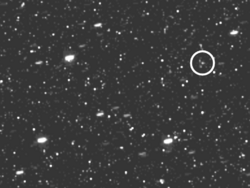Astronomy:Hati (moon)
 Hati imaged by the Cassini spacecraft in November 2015 | |
| Discovery | |
|---|---|
| Discovered by | Scott S. Sheppard David C. Jewitt Jan T. Kleyna Brian G. Marsden |
| Discovery date | December 2004 |
| Designations | |
Designation | Saturn XLIII |
| S/2004 S 14 | |
| Orbital characteristics [1] | |
| 19856000 km | |
| Eccentricity | 0.372 |
| Orbital period | −1038.7 days |
| Inclination | 165.8° |
| Satellite of | Saturn |
| Group | Norse group |
| Physical characteristics | |
| Mean diameter | 5+50% −30% km[2] |
| Rotation period | 5.45±0.04 h[2] |
| Apparent magnitude | 24.4 |
Hati /ˈhɑːti/ or Saturn XLIII is a natural satellite of Saturn. Its discovery was announced by Scott S. Sheppard, David C. Jewitt, Jan Kleyna, and Brian G. Marsden on 4 May 2005, from observations taken between 12 December 2004 and 11 March 2005.
Hati is about 6 kilometers in diameter, and orbits Saturn at an average distance of 20,303 Mm in 1039[3] days, at an inclination of 163° to the ecliptic (165° to Saturn's equator), in a retrograde direction and with an eccentricity of 0.291, quite similar to Mundilfari's orbit. In March 2013, the synodic rotational period was measured by Cassini to about 5.45±0.04 hours. This is the fastest known rotation of all of Saturn's moons,[2] and in fact the fastest known among all moons (including asteroid moons) for which a rotation period has been reliably measured. Like Mundilfari, it is very elongated in shape.[4]
It was named in April 2007 after Hati, a giant wolf from Norse mythology, son of Fenrisúlfr and twin brother of Sköll.
References
- ↑ S.S. Sheppard (2019), Moons of Saturn, Carnegie Science, on line
- ↑ 2.0 2.1 2.2 Denk, T.; Mottola, S. (2019). "Cassini Observations of Saturn's Irregular Moons". 50th Lunar and Planetary Science Conference. Lunar and Planetary Institute. https://www.hou.usra.edu/meetings/lpsc2019/pdf/2654.pdf.
- ↑ "In Depth | Hati". https://solarsystem.nasa.gov/moons/saturn-moons/hati/in-depth.
- ↑ Denk, T.; Mottola, S.; Bottke, W. F.; Hamilton, D. P. (2018). "The Irregular Satellites of Saturn". Enceladus and the Icy Moons of Saturn. 322. University of Arizona Press. pp. 409–434. doi:10.2458/azu_uapress_9780816537075-ch020. ISBN 9780816537488. Bibcode: 2018eims.book..409D. https://tilmanndenk.de/wp-content/uploads/DenkEtAl2018_IrregularMoons.pdf.
- Scott Sheppard's Giant Planet Satellites Page (Saturn Satellite Data)
- Dave Jewitt: 12 new Satellites of Saturn May 3, 2005
- IAUC 8523: New Satellites of Saturn May 4, 2005 (discovery)
- MPEC 2005-J13: Twelve New Satellites of Saturn May 3, 2005 (discovery and ephemeris)
- IAUC 8826: Satellites of Jupiter and Saturn April 5, 2007 (naming the moon)
- Denk, T., Mottola, S. (2013): Irregular Saturnian Moon Lightcurves from Cassini-ISS Observations: Update. Abstract 406.08, DPS conference 2013, Denver (Colorado), October 10, 2013 (synodic rotation period)
 |



